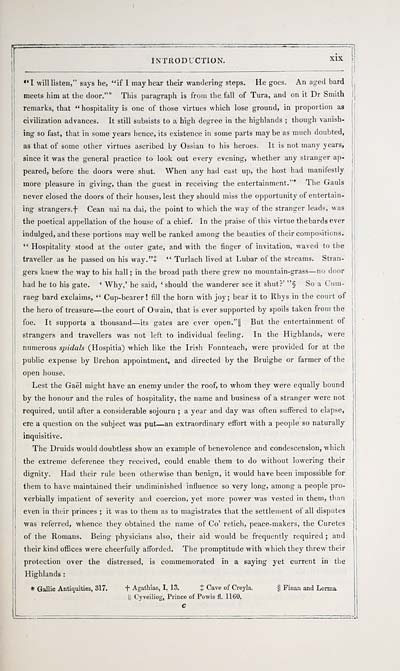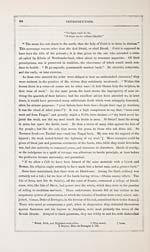Blair Collection > Sar-obair nam bard gaelach, or, The beauties of Gaelic poetry, and lives of the Highland bards
(29)
Download files
Complete book:
Individual page:
Thumbnail gallery: Grid view | List view

INTRODUCTION.
•'I will listen," says he, "if I may hear their wandering steps. He goes. An aged bard
meets him at the door."* This paragraph is from tlie fall of Tura, and on it Dr Smith
remarks, that " hospitality is one of those virtues which lose ground, in proportion as
civilization advances. It still subsists to a high degree in the highlands ; though vanish-
ing so fast, that in some years hence, its existence in some parts may be as much doubted,
as that of some other virtues ascribed by Ossian to his heroes. It is not many years,
since it was the general practice to look out every evening, whether any stranger ap-
peared, before the doors were shut. When any had cast up, the host had manifestly
more pleasure in giving, than the guest in receiving the entertainment."* The Gauls
never closed the doors of their houses, lest they should miss the opportunity of entertain-
ing strangers.f Cean uai na dai, the point to which the way of the stranger leads, was
the poetical appellation of the house of a chief. In the praise of this virtue thebardsever
indulged, and these portions may well be ranked among the beauties of their compositions.
" Hospitality stood at the outer gate, and with the finger of invitation, waved to the
traveller as he passed on his way."+ " Turlach lived at Lubar of the streams. Stran-
gers knew the way to his hall ; in the broad path there grew no mountain-grass — no door
had he to his gate. ' Why,' he said, ' should the wanderer see it shut?' "§ So a Cum-
raeg bard exclaims, " Cup-bearer ! fill the horn with joy; bear it to Rhys in the court of
the hero of treasure — the court of Owain, that is ever supported by spoils taken from the
foe. It supports a thousand — its gates are ever open."|| But the entertainment of
strangers and travellers was not left to individual feeling. In the Highlands, were
numerous spidals (Hospitia) which like the Irish Fonnteach, were provided for at the
public expense by Brehon appointment, and directed by the Bruighe or farmer of the
open house.
Lest the Gael might have an enemy under the roof, to whom they were equally bound
by the honour and the rules of hospitality, the name and business of a stranger were not
required, until after a considerable sojourn ; a year and day was often suffered to elapse,
ere a question on the subject was put — an extraordinary effort with a people so naturally
inquisitive.
The Druids would doubtless show an example of benevolence and condescension, which
the extreme deference they received, could enable them to do without lowering their
dignity. Had their rule been otherwise than benign, it would have been impossible for
them to have maintained their undiminished influence so very long, among a people pro-
verbially impatient of severity and coercion, yet more power was vested in them, than
even in their princes ; it was to them as to magistrates that the settlement of all disputes
was referred, whence they obtained the name of Co' retich, peace-makers, the Curetes
of the Romans. Being physicians also, their aid would be frequently required ; and
their kind offices were cheerfully afforded. The promptitude with which they threw their
protection over the distressed, is commemorated in a saying yet current in the
Highlands :
« Gallic Antitiuities, 317. t Agathias, I. 13. t Cave of Creyla. § Finan and Lonna.
li Cyveiliog, Prince of Powis ii. 1160.
•'I will listen," says he, "if I may hear their wandering steps. He goes. An aged bard
meets him at the door."* This paragraph is from tlie fall of Tura, and on it Dr Smith
remarks, that " hospitality is one of those virtues which lose ground, in proportion as
civilization advances. It still subsists to a high degree in the highlands ; though vanish-
ing so fast, that in some years hence, its existence in some parts may be as much doubted,
as that of some other virtues ascribed by Ossian to his heroes. It is not many years,
since it was the general practice to look out every evening, whether any stranger ap-
peared, before the doors were shut. When any had cast up, the host had manifestly
more pleasure in giving, than the guest in receiving the entertainment."* The Gauls
never closed the doors of their houses, lest they should miss the opportunity of entertain-
ing strangers.f Cean uai na dai, the point to which the way of the stranger leads, was
the poetical appellation of the house of a chief. In the praise of this virtue thebardsever
indulged, and these portions may well be ranked among the beauties of their compositions.
" Hospitality stood at the outer gate, and with the finger of invitation, waved to the
traveller as he passed on his way."+ " Turlach lived at Lubar of the streams. Stran-
gers knew the way to his hall ; in the broad path there grew no mountain-grass — no door
had he to his gate. ' Why,' he said, ' should the wanderer see it shut?' "§ So a Cum-
raeg bard exclaims, " Cup-bearer ! fill the horn with joy; bear it to Rhys in the court of
the hero of treasure — the court of Owain, that is ever supported by spoils taken from the
foe. It supports a thousand — its gates are ever open."|| But the entertainment of
strangers and travellers was not left to individual feeling. In the Highlands, were
numerous spidals (Hospitia) which like the Irish Fonnteach, were provided for at the
public expense by Brehon appointment, and directed by the Bruighe or farmer of the
open house.
Lest the Gael might have an enemy under the roof, to whom they were equally bound
by the honour and the rules of hospitality, the name and business of a stranger were not
required, until after a considerable sojourn ; a year and day was often suffered to elapse,
ere a question on the subject was put — an extraordinary effort with a people so naturally
inquisitive.
The Druids would doubtless show an example of benevolence and condescension, which
the extreme deference they received, could enable them to do without lowering their
dignity. Had their rule been otherwise than benign, it would have been impossible for
them to have maintained their undiminished influence so very long, among a people pro-
verbially impatient of severity and coercion, yet more power was vested in them, than
even in their princes ; it was to them as to magistrates that the settlement of all disputes
was referred, whence they obtained the name of Co' retich, peace-makers, the Curetes
of the Romans. Being physicians also, their aid would be frequently required ; and
their kind offices were cheerfully afforded. The promptitude with which they threw their
protection over the distressed, is commemorated in a saying yet current in the
Highlands :
« Gallic Antitiuities, 317. t Agathias, I. 13. t Cave of Creyla. § Finan and Lonna.
li Cyveiliog, Prince of Powis ii. 1160.
Set display mode to: Large image | Transcription
Images and transcriptions on this page, including medium image downloads, may be used under the Creative Commons Attribution 4.0 International Licence unless otherwise stated. ![]()
| Early Gaelic Book Collections > Blair Collection > Sar-obair nam bard gaelach, or, The beauties of Gaelic poetry, and lives of the Highland bards > (29) |
|---|
| Permanent URL | https://digital.nls.uk/81868216 |
|---|
| Description | A selection of books from a collection of more than 500 titles, mostly on religious and literary topics. Also includes some material dealing with other Celtic languages and societies. Collection created towards the end of the 19th century by Lady Evelyn Stewart Murray. |
|---|
| Description | Selected items from five 'Special and Named Printed Collections'. Includes books in Gaelic and other Celtic languages, works about the Gaels, their languages, literature, culture and history. |
|---|

